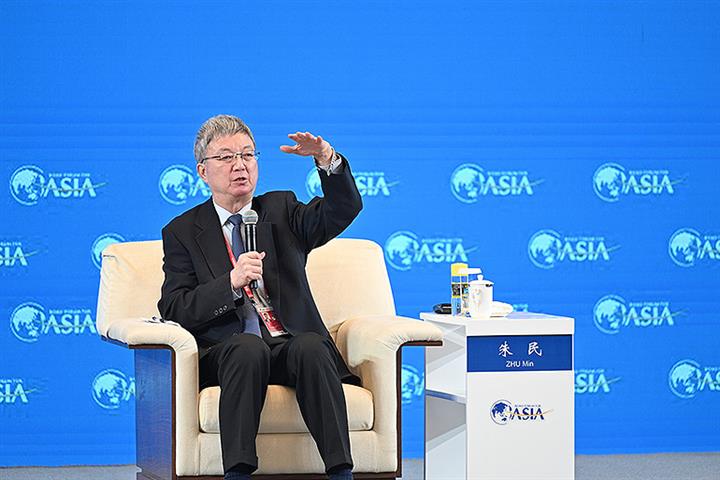 Don’t Underestimate China’s Economic Resilience, Top Chinese Economist Says
Don’t Underestimate China’s Economic Resilience, Top Chinese Economist Says(Yicai Global) April 22 -- The pandemic will take a toll on China’s economy, but its ability to bounce back should not be understated, a leading Chinese economist has said.
“Don’t underestimate the resilience and rebounding power of the Chinese economy, as well as the economic vitality of China’s private enterprises,” Zhu Min, dean of Tsinghua University’s National Institute of Financial Research, told Yicai Global yesterday on the sidelines of the Boao Forum for Asia’s annual gathering.
Responding to the International Monetary Fund this week cutting its forecast for China’s economic growth to 4.4 percent this year from a 4.8 percent projection made in January, Zhu said the IMF expects China’s recent wave of Covid-19 to “pull down the country’s economic growth by about 0.3 to 0.4 percentage point, if you don’t take a future rebound into account.”
Dr. Zhu was a deputy managing director of the Washington-based IMF between 2011 and 2016, and a deputy governor of the People’s Bank of China before that.
In an April 19 update of its Word Economic Outlook, the IMF also said “with continued tight policies toward the real estate sector and the possibility of more widespread lockdowns as part of the strict zero-Covid strategy, China’s economy could slow more than currently projected.”
Zhu said it is hard to forecast economic growth for the whole year now because the end date of the pandemic and what action will be taken to promote the recovery are unknown. He added that if the outbreak ends soon, China would have about six months to stage an economic recovery.
The government has set a target for gross domestic product growth of 5.5 percent this year. First-quarter GDP expanded 4.8 percent from a year earlier amid lockdowns and other Covid-19 restrictions imposed to contain a resurgence of the coronavirus. That was a faster pace than the 4.5 percent average predicted by 17 economists polled by Yicai Global and the 4 percent growth logged in the prior quarter.
Zhu pointe out that although China’s traditional economic drivers -- real estate, infrastructure, and exports -- face greater challenges, investment in the green economy, technological innovation and consumption -- the so-called new pillars of economic growth -- will create more room for recovery once they unleash their potential.
The country needs investments in projects involving electric vehicles, charging piles, clean coal, and solar power to achieve carbon neutrality, Zhu said, adding that the growth prospects of innovative markets such as fifth-generation networks, big data, the Internet of Things, and urban data construction are also promising.
But boosting consumption is a great challenge, he noted. Consumption is usually weak after a Covid-19 outbreak and people's psychology and income expectations will change, so policies to drive domestic demand are very important to encourage household consumption, Zhu added.
With regard to the traditional growth pillars, China must provide financing support for real estate developers and people willing to buy houses, he said, adding that the property market is coming alive as supply and demand are being revitalized.
Meanwhile, China’s infrastructure investment data were sound in the first quarter and its future development will depend on the pickup in demand later, Zhu noted, while any recovery in exports will be more or less affected by external factors.
Editors: Tang Shihua, Futura Costaglione